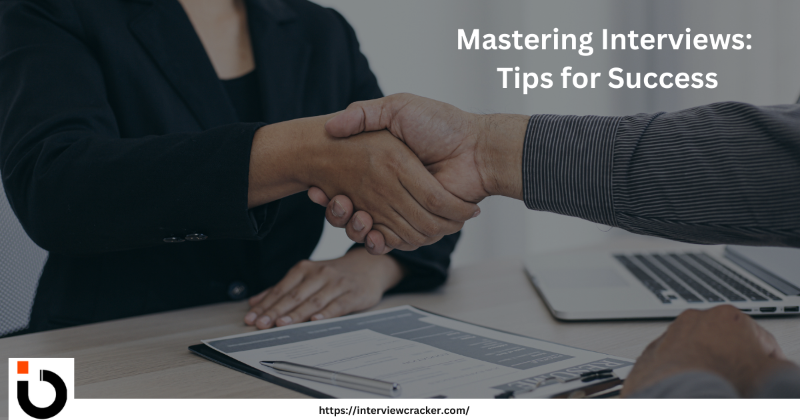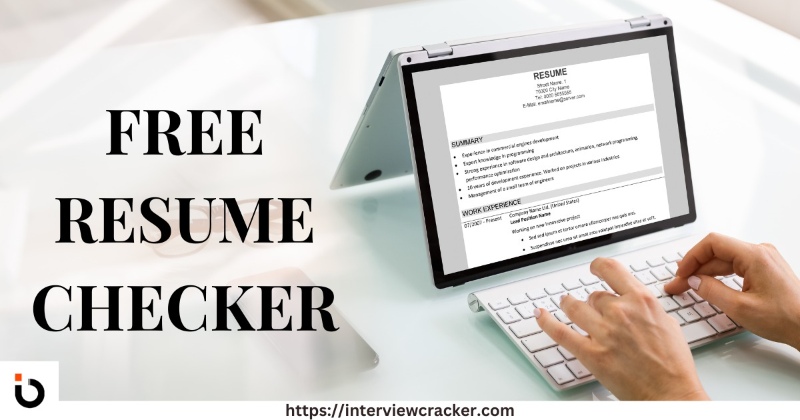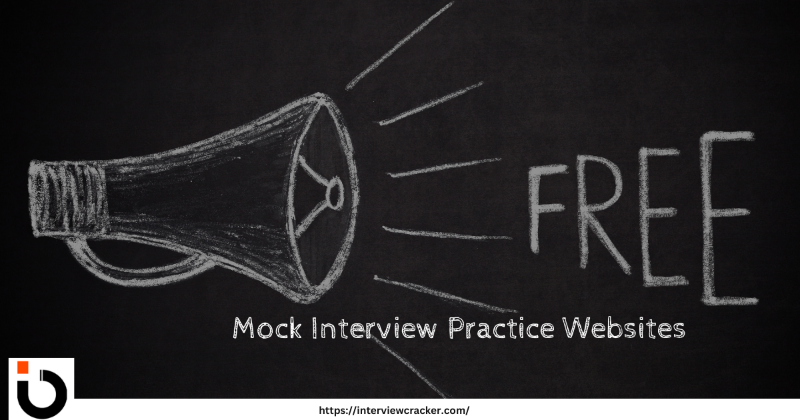In the competitive job market, securing a job interview is an accomplishment in itself. However, your success in the interview process depends on how well you prepare and handle the various stages of the interview. In this article, we will provide essential tips for success in interviews, covering what to do before, during, and after the interview.

Table of Contents
ToggleBefore the Interview: How to Prepare for Success?
Research the Company:
Why should you do research and prepare before an interview?
What research will help prepare you before you apply for a job? Prior to the interview, it’s crucial to gather information about the company’s history, culture, products/services, and recent news. This knowledge demonstrates your genuine interest and helps you tailor your responses to the company’s values and goals.
Prepare Your Documents:
What to bring to a job interview? Always bring multiple copies of your resume, a list of references, and any relevant certificates or licenses. Having these documents readily available shows your professionalism and preparedness.
Plan Your Attire:
Dress appropriately for the position and company culture. It’s better to be slightly overdressed than underdressed. Choose an outfit that makes you feel confident and comfortable.
Map Out the Route:
Determine the interview location and how to get there. Calculate how long it will take to arrive, considering potential traffic or public transportation delays. Aim to arrive at least 15 minutes early.
Practice Interview Questions:
Research common interview questions and prepare thoughtful responses. Consider the STAR method (Situation, Task, Action, Result) for behavioral questions. Also, rehearse questions related to your skills, experience, and why you want the job.

During the Interview: How to Navigate the Interviewer's Questions?
Be Punctual:
Arrive on time to make a positive first impression. Arriving late can reflect poorly on your time-management skills and enthusiasm for the position.
Greet Confidently:
When you arrive, offer a firm handshake and maintain eye contact while introducing yourself. Confidence in your demeanor can set a positive tone for the interview.
Listen Actively:
Pay close attention to the interviewer’s questions. Before responding, take a moment to gather your thoughts. This demonstrates your ability to process information and provide well-thought-out answers.
Highlight Your Value:
Emphasize what you can bring to the company. Discuss your skills, experience, and achievements in a way that aligns with the company’s needs.
Ask Questions:
Engage with the interviewer by asking thoughtful questions about the role, team, and company. This demonstrates your interest and initiative.

After The Interview Tips
After the Interview: How to Follow-Up and What are the Post-Interview Etiquettes to Follow?
Express Gratitude:
Send a thank-you email or handwritten note within 24 hours of the interview. Express your appreciation for the opportunity and reiterate your interest in the position.
Stay Patient:
How early should you arrive for an interview? Arriving early is important, but after the interview, avoid reaching out too soon for updates. Respect the timeline provided by the interviewer for feedback or next steps.
Follow Up Politely:
Should I follow up after an interview? Yes, it’s acceptable to send a brief follow-up email if you haven’t received a response within the expected timeframe. Reiterate your interest and inquire about the status of the hiring process.
Prepare for Background Checks:
If the interview went well and you progress to the next stage, list the steps you should take to properly prepare for a background check. Ensure that your references are informed and ready to provide accurate information.
Evaluate the Experience:
Reflect on the interview to identify areas for improvement. Whether you receive an offer or not, use the experience to enhance your interview skills for future opportunities.
Navigating Salary Negotiations:
Salary negotiations are a critical part of the post-interview process. Here’s how to navigate this important phase:
Handling Salary Discussions During or After Interviews
There are a few things that you need to take care while discussing your salary:
Timing: In most cases, wait until you’ve received a job offer before discussing salary. However, if the interviewer initiates the topic during the interview, be prepared to discuss your salary expectations.
Research and Market Analysis: Before negotiations, research typical salaries for the role in your industry and location. This will help you set realistic salary expectations.
Effective Communication: Clearly communicate your salary expectations, but also be open to a range. Avoid being overly specific unless necessary. Focus on the value you bring to the company.
Justification: Support your salary expectations with reasons such as your qualifications, experience, and the industry standard. Explain how your skills and expertise align with the role’s responsibilities.
Post-Offer Negotiations
Evaluate the Initial Offer: Review the initial job offer, including the base salary, benefits, bonuses, and any other perks. Assess whether it meets your expectations.
Counteroffer Strategically: If the initial offer is below your expectations, consider making a counteroffer that is reasonable but reflective of your value.
Negotiate Holistically: Don’t focus solely on the base salary. Consider other aspects like benefits, flexible work arrangements, or additional bonuses.
Maintain Professionalism: Regardless of the outcome, maintain professionalism and gratitude throughout the negotiation process. It’s an opportunity to build a positive relationship with your future employer.
10 Dos in Interview:
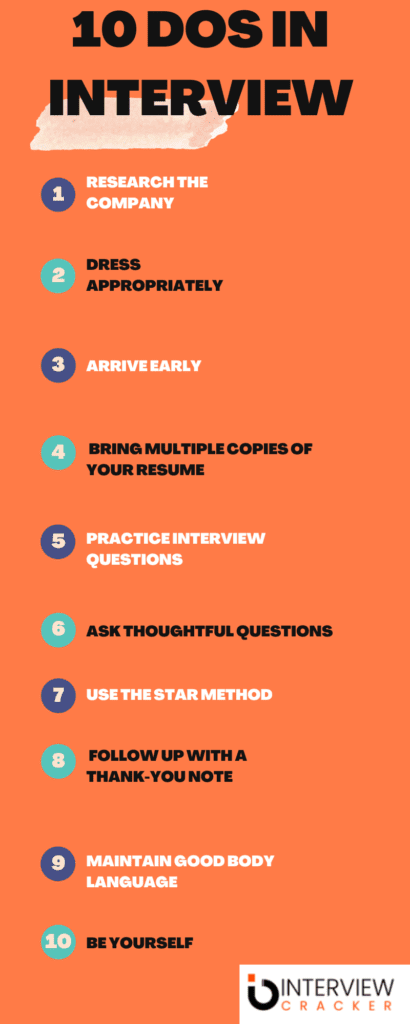
1. Research the Company:
Do research the company thoroughly before the interview. Understand their values, culture, products, and recent news.
2. Dress Appropriately:
Do dress professionally and in line with the company culture. When in doubt, it’s better to be slightly overdressed than underdressed.
3. Arrive Early:
Do plan to arrive at the interview location with plenty of time to spare. Being punctual demonstrates your respect for the interviewer’s time.
4. Bring Multiple Copies of Your Resume:
Do bring extra copies of your resume, as well as any relevant documents or certifications, in a neat and professional folder.
5. Practice Interview Questions:
Do prepare answers for common interview questions, focusing on your skills, achievements, and how you can add value to the company.
6. Ask Thoughtful Questions:
Do ask thoughtful and relevant questions about the company, the role, and the team. This shows your genuine interest and engagement.
7. Use the STAR Method:
Do use the STAR (Situation, Task, Action, Result) method when answering behavioral questions to provide clear and concise examples from your experiences.
Suggested Video : STAR Method Part 1:
STAR Method Part 2:
8. Follow Up with a Thank-You Note:
Do send a thank-you email within 24 hours after the interview, expressing gratitude for the opportunity and reiterating your interest in the position.
9. Maintain Good Body Language:
Do maintain good posture, maintain eye contact, and offer a confident handshake. Non-verbal cues are important.
10. Be Yourself:
Do be genuine and authentic in your responses. Be confident in your qualifications and show enthusiasm for the role.
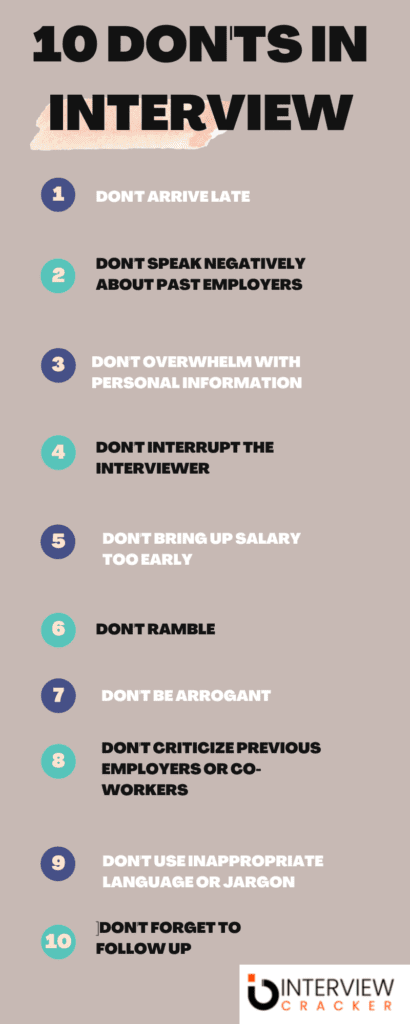
10 Don'ts in The Interview:
1. Don’t Arrive Late:
Don’t be late for the interview. It reflects poorly on your time management skills and professionalism.
2. Don’t Speak Negatively About Past Employers:
Don’t speak negatively about past employers or colleagues. Focus on positive experiences and what you’ve learned.
3. Don’t Overwhelm with Personal Information:
Don’t share too much personal information during the interview. Keep the conversation focused on your professional qualifications.
4. Don’t Interrupt the Interviewer:
Don’t interrupt the interviewer while they’re speaking. Wait for them to finish their question or statement before responding.
5. Don’t Ramble:
Don’t provide overly long or irrelevant answers to questions. Be concise and to the point.
6. Don’t Bring Up Salary Too Early:
Don’t bring up salary and benefits in the initial stages of the interview. Wait for the appropriate moment, which is usually when the employer initiates the discussion.
7. Don’t Criticize Previous Employers or Co-workers:
Don’t criticize or complain about previous employers, supervisors, or colleagues. Maintain a positive and professional tone.
8. Don’t Be Arrogant:
Don’t come across as arrogant or overly confident. Confidence is important, but humility and a willingness to learn are also valued traits.
9. Don’t Use Inappropriate Language or Jargon:
Don’t use excessive jargon or slang that the interviewer may not understand. Keep your language clear and professional.
10. Don’t Forget to Follow Up:
Don’t forget to send a thank-you note. It’s a courteous gesture that can leave a positive impression on the interviewer.
By following these dos and don’ts, you can present yourself as a professional, well-prepared candidate who is a good fit for the position and the company culture.
FAQs
How Early to Show up for an Interview?
It’s essential to arrive at an interview with enough time to spare but not excessively early. Aim to arrive at the interview location approximately 10-15 minutes before your scheduled interview time. However, if you arrive much earlier than this, consider waiting in your car or at a nearby cafe until it’s closer to the designated interview time. This way, you can ensure that you arrive at the company’s reception or interview location at the optimal time, demonstrating punctuality and respect for the interviewer’s schedule.
How Long are Job Interviews?
While the duration can vary, most interviews typically last between 30 minutes to one hour. Be prepared for longer or shorter interviews depending on the position and complexity.
What Should I Bring to An Interview?
When going to an interview, here’s a list of items you should consider bringing with you:
Essentials:
- Multiple copies of your resume.
- A notepad and pen for taking notes or jotting down questions.
- A professional-looking folder or portfolio to keep your documents organized.
Documentation:
- Any required identification, such as a driver’s license or passport.
- Copies of your reference list, if requested.
- Copies of your cover letter, if you submitted one with your application.
- Copies of relevant certificates, licenses, or transcripts, especially if they are job-specific.
Contact Information:
- A list of names and contact information for your reference.
- The name and contact information of the person you’re meeting with (if known).
- The company’s address and phone number in case you need to contact them.
Research Material:
- Notes about the company, its culture, recent news, and the job description.
- Prepared questions to ask the interviewer about the company or role.
Personal Items:
- Breath mints or gum (use discreetly, if necessary).
- A comb or small mirror for quick grooming checks.
- Tissues or a handkerchief.
Optional:
- Portfolio or work samples (if relevant to the position).
- A list of your key achievements and skills for reference.
- Directions to the interview location, even if you have GPS on your phone.
- A printed copy of your online application, if applicable.
Remember that being well-prepared and organized can help you make a positive impression during the interview. Tailor your items to the specific requirements of the job and the company culture to show that you’ve done your homework and are serious about the opportunity.
Describe the Three Different Stages Your Résumé Goes Through When Being Submitted to an Employer.
The stages by which your resumes goes through usually involve:
- initial screening,
- a phone or video interview, and
- an in-person or virtual interview.
How to End an Interview?
Conclude the interview on a positive note by expressing your enthusiasm for the role and gratitude for the opportunity. Ask about the next steps in the hiring process.
How to Ask If You Got the Job?
If you haven’t received a response within the expected timeframe, it’s acceptable to send a polite email or make a brief phone call to inquire about the status of your application.
How to answer “What Are Your Salary Expectations?”
Interview success requires thorough preparation, confident communication, and thoughtful post-interview etiquette. By following these tips for each stage of the interview process, you can increase your chances of impressing potential employers and securing the job you desire. Remember that every interview is an opportunity to learn and grow as a candidate, so approach each one with enthusiasm and professionalism.

